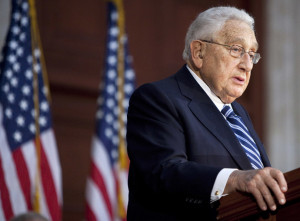
One prominent individual who broke ranks with U.S. policy on Ukraine, was former U.S. national security adviser and former secretary of state, Henry Kissinger, who called the West’s geopolitical play in Ukraine a “fatal mistake” that could lead to a resurgence of the cold war. Ukraine has always had a “special significance” for Russia, Kissinger argues, and failing to recognise this fact is a “fatal mistake”. This is no glorification of Kissinger who is wanted for war crimes over his role in the Chilean coup of 1973 and his subsequent support of the fascist dictator Augusto Pinochet, with the former U.S. diplomat also reportedly referring to soldiers as “dumb, stupid animals to be used as pawns for foreign policy”.
Kissinger however, has opposed Ukraine joining NATO for years and voiced concerns over the present strategy in the country, with his rhetoric sounding far more rational than many other strategists in the U.S. His scepticism with current policy is derived from a desire to include Russia in a world order more than anything else, and growing enmity between Russia and the West decreases the probability of this occurring. In a Washington Post article in March titled: To settle the Ukraine crisis, start at the end, Kissinger warns that to “treat Ukraine as part of an East-West confrontation” would impede the objective of merging Russia and the West:
“To treat Ukraine as part of an East-West confrontation would scuttle for decades any prospect to bring Russia and the West — especially Russia and Europe — into a cooperative international system.” (c) Henry Kissinger
The cold war veteran advocates creating a Ukraine that will serve as a “bridge” between East and West, as opposed to a divisive issue that could potentially lead to direct military confrontation. Other voices from Washington are advocating a far more belligerent policy in Ukraine however, as the U.S. deputy national security adviser Tony Blinken recently suggested Washington should supply Ukrainian forces with “lethal equipment”. This follows the former U.S. ambassador to Ukraine and senior fellow at the Brookings Institution, Steven Pifer, calling for the U.S. to provide Ukraine with “lethal assistance” including “light anti-tank weapons”. Providing the Ukrainian government with U.S. arms would only intensify bloodshed in the country in addition to escalating the situation with Moscow.
CFR admits the West created the crisis in Ukraine
Despite the propaganda pages of the Western media promulgating the lie that Russia instigated the chaos in Ukraine, chief U.S. foreign policy think tank – the Council on Foreign Relations (CFR) – admits the West was the perpetrators of the coup and has destabilised the country. Professor of Political Science at the University of Chicago, John J. Mearsheimer, wrote an article featured in the CFR’s publication, Foreign Affairs, titled: Why the Ukraine crisis is the West’s fault. In the article Mearsheimer documents that “most of the responsibility for the crisis” lies with “the U.S. and its European allies” who are attempting to “integrate [Ukraine] into the West”:
“The United States and its European allies share most of the responsibility for the crisis. The taproot of the trouble is NATO enlargement, the central element of a larger strategy to move Ukraine out of Russia’s orbit and integrate it into the West. At the same time, the EU’s expansion eastward and the West’s backing of the pro-democracy movement in Ukraine — beginning with the Orange Revolution in 2004 — were critical elements, too.”
Mearsheimer continues:
“Although the full extent of U.S. involvement has not yet come to light, clear that Washington backed the coup…The United States and its allies should abandon their plan to westernize Ukraine and instead aim to make it a neutral buffer….. It is time to put an end to Western support for another Orange Revolution…..The result is that the United States and its allies unknowingly provoked a major crisis over Ukraine”
Mearsheimer also notes that present U.S. strategy only serves to “drive Moscow and Beijing closer together”.In addition, he points out that Russia has legitimate concerns over NATO’s eastward expansion since the end of the cold war, and that Washington should understand these concerns as they would not accept a great power – such as China – encircling the U.S.:
“Washington may not like Moscow’s position, but it should understand the logic behind it. This is Geopolitics 101: great powers are always sensitive to potential threats near their home territory. After all, the United States does not tolerate distant great powers deploying military forces anywhere in the Western Hemisphere, much less on its borders. Imagine the outrage in Washington if China built an impressive military alliance and tried to include Canada and Mexico in it.”
The West should indeed “abandon their plan to westernize Ukraine” and refrain from supplying arms to Kiev, in order to make way for peaceful, constructive and pragmatic dialogue which is inclusive of all parties, and stabilise the mess the West created. This would pave the way for the Ukrainian people to determine the future their country takes, without outside interference.
Steven MacMillan is an independent writer, researcher, geopolitical analyst and editor of The Analyst Report, especially for the online magazine “New Eastern Outlook”.
